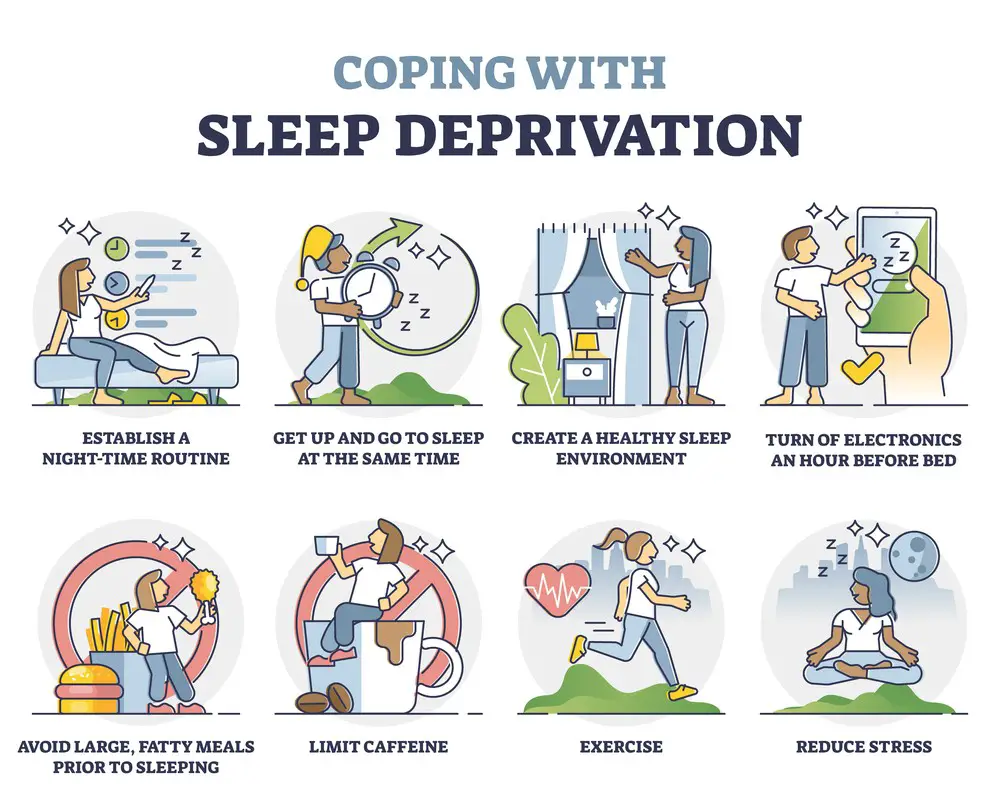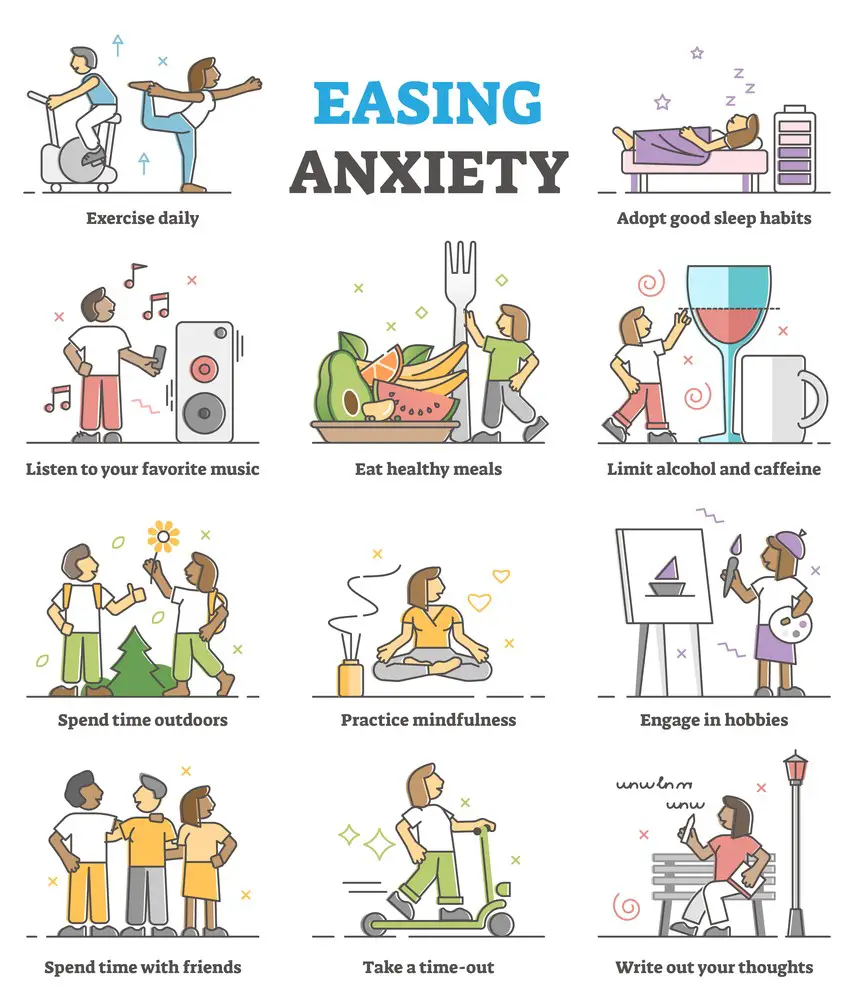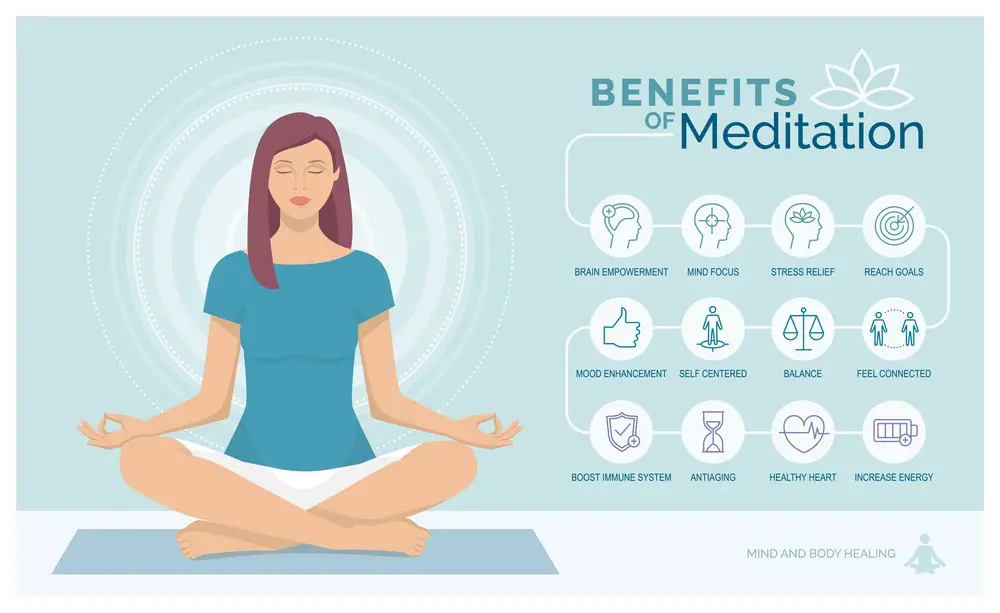As a BetterHelp affiliate, we receive compensation from BetterHelp if you purchase products or services through the links provided
Navigating through days filled with anxiety and nights devoid of restful sleep? You’re not alone in this. The quest for calm and rest leads many down the path of meditation, which has been a solace to restless hearts and minds for centuries. The essence of Meditation for Sleep and Anxiety lies in its simplicity—breathing, being present, and letting go of the day’s chaos. This practice holds a gentle promise: a pathway to quieter minds and better sleep.
In this exploration, we’re diving into various easy-to-adopt meditation practices to ease anxiety and promote sleep. We’ll talk about the benefits of stilling your mind, even briefly each day, and how this simple act can lead to better sleep. And for those curious minds, we’ll delve into the science behind how and why meditation works to ease stress and beckon sleep.
So, if the promise of peaceful nights and lighter days sounds appealing, you’re in for an enlightening journey. Meditation might be the remedy to silence the storm of anxiety and invite a night of peaceful sleep. Through understanding and practice, the path to serene nights and lighter days is not as far as it may seem.
 Benefits of Meditation for Sleep and Anxiety
Benefits of Meditation for Sleep and Anxiety
Improved Sleep Quality
Sleep meditation is a powerful tool for those seeking a peaceful night’s rest and a way to manage anxiety. As we lie in bed, our minds often race with thoughts and worries, making it difficult to fall asleep.
This is where the role of sleep meditation becomes apparent, guiding us to concentrate on our breath and maintain mindfulness of the present moment, facilitating a more effortless transition into deep sleep afterward. Individuals suffering from insomnia or anxiety-related sleep disturbances find it particularly advantageous, as it prepares the mind for a peaceful night by inducing calmness.
 Anxiety Reduction
Anxiety Reduction
Meditation is a profound remedy for anxiety by calming the mind and reducing stress. It provides a sanctuary where you can manage anxious thoughts and emotions with mindfulness, redirecting your focus away from the relentless cycle of worry. You can achieve mental clarity through meditation, untangling the web of distressing thoughts and allowing a tranquil perspective to emerge. This ancient practice empowers you to navigate the labyrinth of anxiety, promoting a profound sense of inner peace and resilience.
Types of Meditation Practices
Mindfulness Meditation
Mindfulness meditation, a practice rooted in ancient traditions, is known for its profound impact on our mental well-being. At its core, mindfulness meditation encourages us to be fully present in the moment, allowing us to observe our thoughts and feelings without judgment. It involves techniques like mindful breathing, body scanning, and guided meditation sessions designed to anchor our awareness in the now. The real-life benefits of embracing mindfulness meditation are nothing short of remarkable.
Incorporating this practice into our daily lives can reduce stress and anxiety, fostering a greater sense of calm and serenity. It enhances our emotional intelligence, empowering us to understand better and manage our thoughts and emotions. Moreover, mindfulness meditation has been shown to improve focus, memory, and creativity, boosting our overall cognitive function. Nurturing a heightened sense of self-awareness equips us to build healthier relationships with ourselves and others.
Guided Meditation
Guided meditation is powerful, offering a structured path towards inner tranquility. In guided meditation, an experienced voice gently directs your thoughts, helping you stay focused and centered. This practice is particularly beneficial for addressing sleep issues and anxiety. It often includes soothing imagery and relaxation techniques, preparing your mind for restful nights, while those designed for anxiety relief guide you in managing and disarming anxious thoughts. The key to success with guided meditation lies in choosing the right sessions that resonate with your needs and preferences, ensuring that the voice and content align with your goals.
Breathing Exercises
Mindful breathing is a meditation technique that focuses on the breath to promote relaxation and reduce stress and anxiety. Concentrating on the sensations of the breath entering and leaving the body can effectively calm the mind and elicit feelings of relaxation. Mindful breathing can be practiced in various settings, making it a versatile and accessible tool for stress management.
To engage in mindful breathing, identify a comfortable position and concentrate on your breath. Take slow, deep breaths, paying attention to the sensations of the breath as it enters and leaves your body. With consistent practice, mindful breathing can significantly reduce stress and anxiety, enhance focus and concentration, and promote relaxation.
 Creating a Meditation Routine
Creating a Meditation Routine
Setting the Stage
Setting the stage for meditation is pivotal in reaping its full benefits. Creating a peaceful environment is the foundation, allowing you to disconnect from the world’s chaos and find your inner sanctuary. Choose the right time that aligns with your daily routine and energy levels, whether it’s the dawn’s tranquility or the hush of nighttime. Necessary props and tools can enhance your meditation experience; from comfortable cushions to soothing music or guided meditation apps, these aids can help you find your zone. By carefully curating your meditation space and time, you set the stage for a practice that can usher in serenity and mindfulness, creating a haven in your day to rejuvenate your body and mind.
Meditation Techniques
Meditation techniques are valuable tools on the path to a more serene and balanced life. One crucial aspect is finding your focus, where you can choose from various methods like mindfulness, guided meditation, or breath awareness to identify what resonates best with your needs. It’s about tailoring your meditation practice to suit your preferences and goals, ensuring a more meaningful and effective experience.
Consistency is equally essential – integrating meditation into your daily routine allows you to harness its long-term benefits. Just as physical exercise strengthens your body over time, regular meditation can bolster your mental and emotional well-being.
Another powerful application of meditation techniques addresses both sleep and anxiety concerns. You can holistically tackle the root causes of sleep disturbances and anxiety by combining specialized meditation practices. This comprehensive approach fosters improved sleep patterns and a more resilient response to anxiety triggers, enhancing overall quality of life. So, remember, meditation isn’t a one-size-fits-all solution; it’s a versatile toolkit to help you find your focus, maintain consistency, and harmoniously address the intricacies of sleep and anxiety.
Many online resources are available to help you explore and practice sleep meditation, ranging from apps and websites to YouTube channels offering guided meditation sessions. Utilizing site statistics to understand the popularity and effectiveness of these resources can help you decide which sleep meditation practices to develop and improve new ones to follow.
When choosing a guided meditation service, ponder over factors like cost, subscription terms, and the type of personalized content and ads of meditation provided to identify the one that aligns most closely with your needs and preferences, depending on your settings. Additionally, consider the quality of those services to ensure you receive the best experience possible.
 When It’s Time to Seek Therapy
When It’s Time to Seek Therapy
Despite all self-help strategies, there might come a time when professional help is necessary to navigate through the storm of anxiety and sleepless nights. Recognizing this need is crucial. Here are some signs that it might be time to seek therapy:
- Persistent feelings of anxiety or stress that interfere with your daily life.
- Insomnia or other sleep disorders that don’t improve with self-help strategies.
- Overwhelming feelings of sadness or hopelessness.
- Physical symptoms without a clear medical cause, such as headaches or stomachaches.
- Withdrawal from activities or relationships you once enjoyed.
Mapping Your Way to Peace: Setting Goals
Clear, achievable goals can be a game-changer in managing anxiety and improving sleep. Here’s how you could approach this:
- Identify your primary goals: To reduce anxiety, improve sleep quality, or both?
- Break down larger goals into smaller, manageable steps, such as meditating for 10 minutes daily or establishing a relaxing bedtime routine.
- Celebrate small victories along the way; they are the stepping stones towards your larger goal.
Celebrating Your Journey: Recognizing Progress
Every step forward, no matter how small, is progress. It’s important to acknowledge and celebrate your journey towards improved sleep and reduced anxiety:
- Maintain a journal to track your meditation practices, anxiety levels, and sleep quality.
- Reflect on your progress regularly. Recognize the efforts you’ve made and the minor improvements along the way.
- Share your progress with a supportive community, or join a meditation group to continue learning and growing.
The path towards peace of mind and restful sleep is a personal journey laden with challenges and triumphs. With a blend of self-help strategies and, when needed, professional guidance, the serene nights and calmer days you yearn for are within reach.
Conclusion
In conclusion, sleep meditation offers a powerful solution for those struggling with anxiety, stress, and sleep disturbances. By exploring various meditation practices, understanding the science behind them, and incorporating them into your daily routine, you can effectively manage stress, improve sleep quality, and promote overall well-being. Don’t hesitate to explore the wealth of online resources available to support your journey and discover the transformative power of sleep meditation.
- Left Arm Pain and Anxiety: Understanding the Relationship - November 23, 2023
- Anxiety Paralysis: Coping with Overwhelming Stress - November 23, 2023
- Anxious vs. Nervous: Differentiating Emotions and Responses - November 15, 2023
This site contains affiliate links to products. We will receive a commission for purchases made through these links.


 Benefits of Meditation for Sleep and Anxiety
Benefits of Meditation for Sleep and Anxiety Anxiety Reduction
Anxiety Reduction
 Creating a Meditation Routine
Creating a Meditation Routine
 When It’s Time to Seek Therapy
When It’s Time to Seek Therapy
